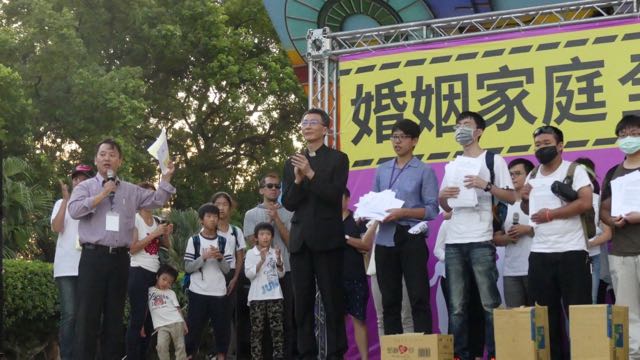How Taiwan’s ‘Silent Majority’ Blocked Same-Sex ‘Marriage’ Momentum
NEWS ANALYSIS: Significant Christian Influence on Pro-Family Outcome, Despite Small Numbers

WASHINGTON — Until local elections that were held Nov. 24, Taiwan was considered the San Francisco of Asia — the most “gay-friendly” country in the region, set to redefine marriage to include same-sex couples, as ordered by the country’s highest court.
What happened instead surprised even Catholic clergy deeply involved in defending pro-family laws.
In a set of five referendum questions, Taiwan overwhelmingly affirmed traditional marriage and voted to remove content reflecting gender ideology from elementary- and junior-high-school curricula; 66.1% of approximately 19 million eligible voters participated.
A diverse coalition of religious groups fueled the pro-family campaign, including Buddhists and adherents to Daoism. Some secular associations were engaged, too.
Yet Christians led the movement, despite representing only about 5.5% of the population (4.1% Protestant and 1.4% Catholic in 2010).
Victory for Tradition
“Honestly, I didn’t expect it,” Father Otfried Chan, secretary-general of the Chinese Regional Bishops’ Conference (CRBC), told the Register via Skype. “It is a blow to the gay sex movement.” The CRBC is Taiwan’s episcopal conference.
“I cannot explain it except to say: The Holy Spirit moved people,” offered lay Catholic missionary Johnpaul Lin.
The results were 72.5% “Yes” and 27.5% “No” on the key question, Case 10: “Do you agree that marriage defined in the Civil Code should be restricted to the union between one man and one woman?”
A related question, Case 11, asked voters if they want to discontinue gender ideology for students ages 6-15, a program approved by the legislature in 2004: “Do you agree that the Ministry of Education should not implement the Enforcement Rules for Gender Equity Education Act in elementary and middle schools?”
In response, 67.4% voted “Yes,” while 32.6% said “No.”
Mirror-opposite questions proposed by activists — affirming same-sex “marriage,” as well as education for students at all levels on “gender equality … sex education, same-sex education” — were roundly defeated.
So traditional values trumped change by a 2-1 margin in a country where the government, judicial system, Ministry of Education, legislature and popular perception were primed to see Taiwan become the first Asian country to legalize same-sex “marriage.”
Taiwan’s victory is a case study in the value of ecumenical advocacy, and messaging that doesn’t shy from confronting the decadence that animates sexual liberation ideology.
It also shows the importance of having democratic paths to oppose social engineering by the elite. Taiwan’s referendum process is less than a year old.
Rejecting ‘an Imperial Invasion”
Sister Stefania Wei served as a Catholic representative to the “Alliance of Religious Groups for the Love of Families Taiwan” (often called “Taiwan Family”), an important group dedicated to protecting marriage, founded in 2013.
She thinks the massive annual “Gay Pride Parade” in Taipei, the biggest in Asia, benefited pro-family campaigners.
Held two months ago, the high-profile event brought more than 130,000 activists to the country, many from abroad, for the 15th year. It was particularly celebratory in October 2018, as it was in 2017, anticipating victory for the redefinition of marriage.
The parade “is too much for most people. Their style, the costumes, the gestures — it caused many people to have a negative reaction,” explained Sister Stefania to the Register by telephone. “This culture is against traditional ways of expressing love.”
“Many people sympathized [with same-sex ‘marriage’] before, but after the rally, they turned to the other side,” she said. At the same time, Sister Stefania said the Church was able to use the referendums as an opportunity to catechize on the sanctity of family life.
Johnpaul Lin described the impression many Taiwanese have when viewing media coverage of events like the Gay Pride Parade. “Homosexual culture is an imperial invasion,” he told the Register by phone.
“Taiwanese people are not against foreigners. For a long time, we idolized the U.S.A. and Western Europe,” explained Lin. “But we believe we have good people because we have good families raising good children. This is the natural law. Living in a stable family, based on stable marriage — this is the foundation of society. We won’t go against that.”
Political Earthquake
Taiwan Church News, published by the Presbyterian church, ran a headline describing the election and referendum results as “a political earthquake.” (Besides the pro-family results, the ruling Democratic Progressive Party, DPP, lost the majority of mayoral and county contests.)
However, if the great majority of Taiwanese citizens feel so strongly about family values, why was anyone surprised at the electoral outcome? Because the country’s elite was just months away from imposing same-sex “marriage” on Taiwan, when this democratic countereffort snatched victory from the jaws of defeat.
Understanding the political victory takes recognizing the top-down pressure to make Taiwan Asia’s sexually permissive beachhead — a globalist power play perceived by the Church and other Christians concretely five years ago, when the religious alliance was founded by a group of pastors lobbying the Legislative Yuan (parliament) to reject an early version of same-sex “marriage” legislation.
In January 2016, Taiwan elected its first woman president, Tsai Ing-wen, an unmarried lawyer and former international trade negotiator with advanced degrees from Cornell and the London School of Economics.
Her campaign made support for same-sex “marriage” a signature issue.
One campaign video, released on Chinese Valentine’s Day (the Qixi festival in August), featured three same-sex couples, among others, a gesture applauded by the political allies. She raised donations by selling bus cards with the rainbow theme, referencing Rosa Parks and John Lennon in the sales pitch — appealing to American and British cultural references.
“The DPP favors Taiwan’s decisive independence from China,” explained one astute Catholic observer, “so it seeks alliances with the West. Emphasizing LGBT credentials is one way to gain outside support, to make Taiwan more powerful vis-à-vis China.”
DPP also won control of Taiwan’s unicameral legislature in 2016.
Rallying With New Allies
Father Chan remembers lobbying with a CRBC bishop against a DPP legislative proposal (promoted by international organizations) to redefine marriage, replacing “between a man and a woman” with “between two partners” in the country’s Civil Code five years ago.
“It was then that a lot of people, in particular, Christians, were alerted and mobilized to protest and to counter this political agenda,” said Chan. “And we succeeded. So the bill was stopped,” and “Taiwan Family” was founded.
“At the time, the common, urgent need was to stop the political influence of the LGBT movement,” recalled Chan. With the election of President Tsai, everyone knew same-sex “marriage” would be proposed one way or another.
Protestants created the “Coalition for the Happiness of the Next Generation” as a vehicle for rallies and heightened political organizing. (It also joined the religious alliance.)
In 2016, the Happiness Coalition sponsored numerous, massive rallies to defend marriage.
Father Chan was often invited to speak. Images of thousands of people holding identical signs with the slogan “Marriage and Family, Decided by the People” foreshadowed the fact that a democratic movement was the only way to stop the same-sex “marriage” juggernaut in Taiwan.

The Happiness Coalition challenged the romantic idea that all homosexual people want is to mimic monogamous life. Instead, the coalition portrayed the central problem as normalizing lifestyles with negative social implications.
An article on its website, describing the behavior symbolically represented by the rainbow flag, attracted more than 1.5 million readers. (Taiwan’s total population is 23.6 million.)
High Court Ruling
The 15-member Council of Grand Justices, which serves as a constitutional court, is a politicized body since the president appoints members as terms expire.
In May 2017, 12 out of 14 justices (one abstained) ruled that limiting marriage to a man and woman violates the Taiwanese Constitution. The decision gave the legislature two years to approve new law conforming to the ruling. If the legislature didn’t act, same-sex “marriage” would automatically be legalized.
But that year, too, the Yuan approved an easier process for getting referendums before voters and lowered the voting age to 18. The objective was to deepen democracy — and have a tool for taking the island’s pulse on existential questions, such as Taiwan’s relationship to China.
Pro-Family Referendum
It was the Happiness Coalition’s Frank Tseng, a 30-something member of the Taipei Truth Lutheran Church, who emerged as a major strategist for using the referendum process to counter the “LGBT” agenda, together with leadership from the independent Bread of Life Church, located in Taiwan as well as Australia, Canada, Hong Kong and California.
Three questions were crafted that needed first to gain 281,745 voter signatures within six months and, second, to gain approval from a panel of legal specialists.
Father Chan explained the Happiness Coalition took the lead with the referendum because it is a more politically engaged group, while the religious alliance remains politically neutral.
From the Catholic viewpoint, the fly in the ointment is a doctrinal and strategic divergence that led Protestants to design a referendum question not supported by the Catholic Church.
The question, Case 12, “Do you agree to the protection of the rights of same-sex couples in cohabitation on a permanent basis in ways other than changing of the Civil Code?” was supposed to defend the family while making a concession to the high court ruling, according to the Happiness Coalition.
It was approved by a vote of 61.1% “Yes” and 38.9% “No,” despite the Catholic position that the referendum endorses a special law for same-sex couples, so voters should say “No” because homosexual behavior should not be encouraged in law.
Same-Sex Civil Unions
As a result of the referendum, the Yuan has three months to legislate voter preferences.
The government has already announced it will draft a special law covering same-sex couples, probably creating a form of civil union — leaving the marriage code intact.
Now, the Happiness Coalition finds itself trying to push back against a political solution that effectively awards marriage to same-sex couples, without using the “M” word.
As Father Chan explains: “During the campaign, the position adopted by the Catholic Church in Taiwan, based on the Congregation for the Doctrine of the Faith’s stand, was misunderstood and criticized even by Catholics.”
“The reality of what’s happening now [in the Yuan] reminds us: The Catholic Church is the guardian of the truth,” the priest observed.
“The definition of marriage between a man and a woman is of divine origin and must be always respected and taught as such. It is totally self-contradicting to safeguard the legal definition of marriage between a man and a woman on the one hand [Case 10] and to allow same-sex behavior to be legalized on the other hand [Case 12],” Father Chan pointed out.
Big Win Against Gender Ideology
The resounding decision to withdraw pro-gender ideology curriculum for students in elementary and high school is a tremendous victory, Catholics agree.
Johnpaul Lin believes that win is the product of the shock Taiwanese families felt when they realized their children were being turned against their own values.
“People began asking each other, ‘Why are the children getting this education about sexual depravity?’ I said the same thing, because the government did it secretly,” recounted Lin.
“Taiwan has seen a massive revolt against teaching LGBT values in schools,” he explained. “For so many years, Taiwanese people spent many, many hours working. We trusted the government to educate our children well. So when people noticed the sex-education lessons and gender ideology, they couldn’t believe it. Incredible!”
Lin concluded, “This was a major reason people voted against same-sex ‘marriage’ and gender ideology in the referendum.”
Register senior correspondent Victor Gaetan is an award-winning international
correspondent and a contributor to Foreign Affairs magazine and The American Spectator.
- Keywords:
- same-sex marriage
- taiwan
- victor gaetan

















